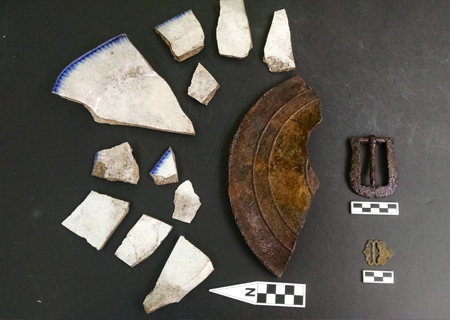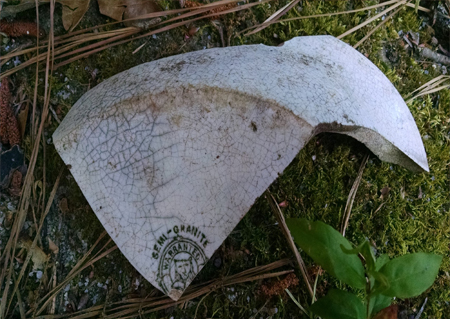

History
History is the systematic study and documentation of the human past. The period of events before the invention of writing systems is considered prehistory. "History" is an general term that emcompasses past events as well as the memory, discovery, collection, organization, presentation, and interpretation of these events. Historians seek knowledge of the past using historical sources such as written documents, oral accounts, art and material artifacts, and ecological markers.[5] History is incomplete and still has debatable mysteries.
Top of Page
Historic Rolesville Society

In 2017 Michael Bailey filed the paperwork to establish the Historic Rolesville Society. With Mike's interst in metal detecting it was a natural step to take to manage a growing collection of artifacts. So, he created the organization with the primary goals of collecting and preserving artifacts, objects, publications, photographs and other documentary materials related to local, ethnic and family history as well as disseminating information about the history of the area through exhibits, educational programs and publications based on the the organization's findings. Lastly, it is the intent of HRS to encourage the preservation of the archeological, historical, and architectural heritage of the Town of Rolesville and its surrounding area.
An interesting side note ... many people tend to refer to the organization as the "Rolesville Historic Society" which is incorrect, technically. One of the main reasons the name was chosen as it is filed was so the abbreviation, HRS, would not be confused with that of Rolesville High School(RHS). Since both organization have a tendency to be mentioned in local news and conversation, HRS wanted to be sure each entity got their appropriate credit for the work being done in the community.
Top of Page
Town of Rolesville

Rolesville is a town in northeastern Wake County, North Carolina, United States, a suburb of the capital city of Raleigh. It is the second oldest town in Wake County and has been one of the fastest-growing towns in the state of North Carolina for the past several years. The population was 9,475 at the 2020 census.
Rolesville was incorporated on January 18, 1837, by the North Carolina Legislature. In 2012, the town celebrated its 175th anniversary.
Rolesville used to be nothing more than a minor farming community with its land being mostly owned by William H. Roles, a merchant, cotton broker, and postmaster throughout the late 1700s through 1830s. Rolesville was named after Roles and incorporated in January of 1837, making it the second oldest town in Wake County. With its humble history, the town has three locations listed on the National Register of Historic Places, those being the Heartsfield-Perry Farm, Green-Hartsfield House, and the Dr. Lawrence Branch Young House.
Rolesville's Northeastern Wake County location makes it an ideal community for those that want a homesite along a quaint, natural setting, while being only sixteen miles of downtown Raleigh and ten minutes from Wake Forest. Over the years Rolesville has also experienced a surge in new construction of neighborhoods, businesses, and community facilities. The News&Observer even documented Rolesville as North Carolina's fastest growing town in 2017. Large neighborhoods have been developed throughout the early 2000s onward, and a new high school was constructed in 2013. The popular Main Street Park was developed in 2005, and has been adding new attractions ever since.
Top of Page
Wake County

Pre-colonization present-day Wake County was part of the Tuscarora nation. The Tuscarora are a Native American tribe and First Nations band government of the Iroquoian family, with members today in New York, USA, and Ontario, Canada. They coalesced as a people around the Great Lakes, likely about the same time as the rise of the Five Nations of the historic Iroquois Confederacy, also Iroquoian-speaking and based then in present-day New York.
Wake County was formed in 1770 from parts of Cumberland County, Johnston County, and Orange County. The first courthouse was built at a village originally called Wake Courthouse, now known as Bloomsbury. In 1771, the first elections and court were held, and the first militia units were organized.
Wake County lost some of its territory through the formation of other counties. Parts were included in Franklin County in 1787, and in Durham County in both 1881 and 1911.
During the colonial period of North Carolina, the state capital was New Bern. For several years during and after the Revolutionary War, there was no capital, and the General Assembly met in various locations. Fayetteville was the state capital in 1786, 1789, 1790, and 1793, when Raleigh became the permanent state capital in 1794.[6] In 1792, a commission was appointed to select a site to build a permanent state capital. The commission members favored land owned by Colonel John Hinton across the Neuse River, but the night before the final vote, the committee adjourned to the home of Joel Lane for an evening of food and spirits. The next day, the vote went in Lane's favor.
Lane named Wake County in honor of Margaret Wake Tryon, wife of colonial Governor William Tryon.[7] Raleigh was named after Sir Walter Raleigh, and established in 1792 on 1,000 acres (4.0 km2) purchased from Lane. Raleigh had never set foot in North Carolina, but he had sponsored the establishment of the first English colony in North America on North Carolina's Roanoke Island in 1585. The city of Raleigh became both the state capital and the new seat of Wake County.
Top of Page
North Carolina

North Carolina is a state in the Southeastern region of the United States. The state is the 28th largest and 9th-most populous of the United States. It is bordered by Virginia to the north, the Atlantic Ocean to the east, Georgia and South Carolina to the south, and Tennessee to the west. In the 2020 census, the state had a population of 10,439,388. Raleigh is the state's capital and Charlotte is its largest city. The Charlotte metropolitan area, with a population of 2,595,027 in 2020, is the most-populous metropolitan area in North Carolina, the 21st-most populous in the United States, and the largest banking center in the nation after New York City. The Raleigh-Durham-Cary combined statistical area is the second-largest metropolitan area in the state and 32nd-most populous in the United States, with a population of 2,043,867 in 2020, and is home to the largest research park in the United States, Research Triangle Park.
The earliest evidence of human occupation in North Carolina dates back 10,000 years, found at the Hardaway Site. North Carolina was inhabited by Carolina Algonquian, Iroquoian, and Siouan speaking tribes of Native Americans prior to the arrival of Europeans. King Charles II granted eight lord proprietors a colony they named Carolina after the king and which was established in 1670 with the first permanent settlement at Charles Town (Charleston). Because of the difficulty of governing the entire colony from Charles Town, the colony was eventually divided and North Carolina was established as a royal colony in 1729 and was one of the Thirteen Colonies. In 1755, colonial North Carolina received its first postmaster, James Davis, appointed by Benjamin Franklin. The Halifax Resolves resolution adopted by North Carolina on April 12, 1776, was the first formal call for independence from Great Britain among the American Colonies during the American Revolution.
On November 21, 1789, North Carolina became the 12th state to ratify the United States Constitution. In the run-up to the American Civil War, North Carolina declared its secession from the Union on May 20, 1861, becoming the tenth of eleven states to join the Confederate States of America. Following the Civil War, the state was restored to the Union on July 4, 1868. On December 17, 1903, Orville and Wilbur Wright successfully piloted the world's first controlled, sustained flight of a powered, heavier-than-air aircraft at Kitty Hawk in North Carolina's Outer Banks. North Carolina often uses the slogan "First in Flight" on state license plates to commemorate this achievement, alongside a newer alternative design bearing the slogan "First in Freedom" in reference to the Mecklenburg Declaration and Halifax Resolves.
North Carolina is defined by a wide range of elevations and landscapes. From west to east, North Carolina's elevation descends from the Appalachian Mountains to the Piedmont and Atlantic coastal plain. North Carolina's Mount Mitchell at 6,684 ft (2,037 m) is the highest point in North America east of the Mississippi River. Most of the state falls in the humid subtropical climate zone; however, the western, mountainous part of the state has a subtropical highland climate.